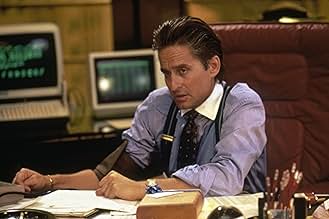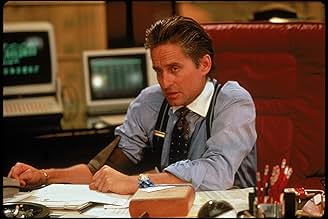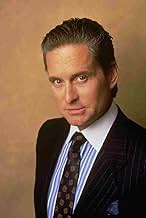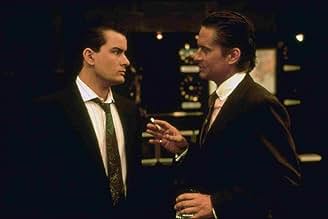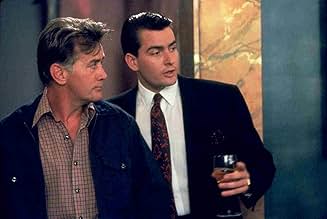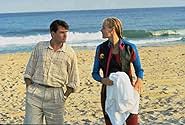Un giovane ambizioso agente di borsa è disposto a tutto pur di arrivare al top della sua professione, e non esita a violare la legge per conto di un uomo d'affari senza scrupoli che lo prend... Leggi tuttoUn giovane ambizioso agente di borsa è disposto a tutto pur di arrivare al top della sua professione, e non esita a violare la legge per conto di un uomo d'affari senza scrupoli che lo prende sotto la sua tutela.Un giovane ambizioso agente di borsa è disposto a tutto pur di arrivare al top della sua professione, e non esita a violare la legge per conto di un uomo d'affari senza scrupoli che lo prende sotto la sua tutela.
- Regia
- Sceneggiatura
- Star
- Vincitore di 1 Oscar
- 9 vittorie e 4 candidature totali
- Chuckie
- (as Chuck Pfeifer)
Recensioni in evidenza
The film follows a low level day trader (Charlie Sheen) who strives to become a very powerful figure on Wall Street like his idol Gordon Geckko (Michael Douglas). To justify his rise to power, he uses his father (Martin Sheen) knowledge of the flight industry for his own personnel gains. He wants to get his foot into the door of the oily Geckko. Will he sell his soul for a quick buck? How far and fast will this rising star soar? To find these answers check out Wall Street.
This film was made immediately after Platoon. Stone made it clear that he wasn't going to let an Oscar winning malaise effect him. He explores the two fathers theme that he used in Platton and once again makes it work. A highly underrated film that has sadly been neglected by the mainstream audience. What makes it even sadder is the fact that it still applies today.
Highly recommended.
I love the anxious, terrifyingly rapid advance given to the young Bud Fox from a chance comment in Gekkos daunting office, the instant changes of mood by Micheal swinging from interviewing to lambasting an industry peer on the phone and back to interviewing without a flicker.
Inspirational in the 'no fear' modus operandi of Gordon and then Bud, almost 'you can do anything if you dare' which has always given me a lift when I watch it.
Lush settings, and marvellous counterpointing performance of Terence Stamp, illustrating the 'Gekko' figure scenario in turn to Gordon nas Gordon had to Bud...
Await all Michaels movies with bated breath...Falling down....wonderful...but thats another story
In today's dumbed down movie world, Gordon Gekko could have been scripted and played exactly the same except for one thing: you'd never see the scene when he suddenly stops to admire the ocean at dawn. Fortunately Michael Douglas clearly added his own dimensions to the character whom, if left to Stone, would have been a cardboard money-grabber. As far as Stone is concerned Gekko wants money for its own sake, but Michael Douglas manages to evince a man who revels in the power and influence that money gets him. Stone's dialogue actually undercuts this perception on occasion, as when Bud Fox yells at Gekko, "How many yachts can you sail!?", and when Gekko, enticing Fox by outlining how rich he could be, says, "Rich enough to have your own jet" - as if owning a jet wasn't the minimum accoutrement you'd expect from the least successful company director or minor pop star. Other infelicities in the script include the moment when Stone wanted to signal that Bud Fox has reached the peak of success and found it empty: following the montage of the condo purchase and decoration, the perfect meal for two, culminating in making love to Daryl Hannah, Stone has Fox standing on his balcony, and apropos of nothing at all, he just says, "Who am I?" It has to be said that Sheen wasn't really up to the task of delivering this atrocious line.
I've rarely seen a film in which the female lead was so comprehensively abandoned by the director. Stone clearly wanted to focus all his attention on Sheen and crucially on Douglas, leaving Hannah floundering and unable to clearly express just how much into Bud Fox her character is at any one time. At the final break-up you almost hear Stone's sigh of relief at being able to get rid of the irrelevant female (probably forced on him by the studio) and concentrate on the man's world of stockbroking.
I seem to be finding a lot of flaws in what is basically a most compelling and watchable film. Despite the complex jargon-riddled technicalities of the subject matter, the movie's plot grabs hold of the viewer from the first scene and never lets go. Of course Douglas dominates most of the movie, until Fox sr. (Sheen sr.) throws the spanner in the works of his son's airline deal. Thank heavens Charlie Sheen took the unbelievably courageous decision to have his own father (instead of Jack Lemmon) play his character's father because the two of them perform an absolute barnstormer of a scene in which every word, inflexion and facial expression is repleat with absolute truth; and it's all the more poignant considering Charlie Sheen's own personal difficulties which faced him in later years, and the well-publicised ups and downs of his relationship with Martin as a result. Had those troubled times preceded this movie, it's hard to imagine the performances could have been any different - that's how good they are.
Fantastic character support comes from Hal Holbrook, the always reliable Saul Rubinek and John C. McGinley (who does not seem to have changed at all in the intervening years!), a young James Spader and the magisterial Terence Stamp who understands the unutterable menace with which it is possible to lace the single word "Mate".
The characters are interesting and richly developed, with the exception of Darryl Hannah's underwritten character. I can see why she didn't like playing that role. Douglas is always a joy to watch, and makes a suave yet slimy villain. I wouldn't necessarily say he deserved an Oscar, but he did a fine job nonetheless. So did Charlie Sheen, who is actually the star of the film despite the fact that most people remember "Wall Street" for Douglas as Gordon Gecko. Sheen gives a fine multi-dimensional performance. I love the scenes between him and his father Martin Sheen, who plays his father in the film. Oliver Stone made a great choice casting the father-and-son team, since the tension in their scenes feels very authentic.
There are some predictable plot turns and character arcs, but altogether Stone keeps the excitement going. I like how the climactic scene between Douglas and Sheen is shot without cuts, with the camera moving from person to person, keeping the tension going. If I knew at least an inkling about the stock market, I wouldn't be completely lost during certain scenes, but what can you do? I still think it's a fine film with solid performances.
My score: 7 (out of 10)
Lo sapevi?
- QuizThe first feature film to show a character using a mobile cellular telephone.
- BlooperAt the beginning of the movie, Bud Fox and Marvin say Gordon Gekko was shorting NASA stock right after the Challenger explosion. The scene is set in 1985, but the Space Shuttle Challenger exploded January 28, 1986.
- Citazioni
Gordon Gekko: The richest one percent of this country owns half our country's wealth, five trillion dollars. One third of that comes from hard work, two thirds comes from inheritance, interest on interest accumulating to widows and idiot sons and what I do, stock and real estate speculation. It's bullshit. You got ninety percent of the American public out there with little or no net worth. I create nothing. I own. We make the rules, pal. The news, war, peace, famine, upheaval, the price per paper clip. We pick that rabbit out of the hat while everybody sits out there wondering how the hell we did it. Now you're not naive enough to think we're living in a democracy, are you buddy? It's the free market. And you're a part of it. You've got that killer instinct. Stick around pal, I've still got a lot to teach you.
- Curiosità sui creditiBuilding illustrations are shown during entire end credits
- Versioni alternativeIn the VHS release, instead of the correct 1981-1994 20th Century Fox logo, the 1953-1981 logo is used.
- Colonne sonoreFly Me to the Moon
Words and Music by Bart Howard (ASCAP)
Published by The Hampshire House Publishing Corp. (ASCAP)
Performed by Frank Sinatra
Courtesy of Reprise Records
By Arrangement with Warner Special Products
Arrangement by Quincy Jones (uncredited)
I più visti
Dettagli
- Data di uscita
- Paese di origine
- Sito ufficiale
- Lingua
- Celebre anche come
- El poder y la avaricia
- Luoghi delle riprese
- 60 W. 75th St, New York, New York, Stati Uniti(Bud's first apartment building)
- Aziende produttrici
- Vedi altri crediti dell’azienda su IMDbPro
Botteghino
- Budget
- 15.000.000 USD (previsto)
- Lordo Stati Uniti e Canada
- 43.848.069 USD
- Fine settimana di apertura Stati Uniti e Canada
- 4.104.611 USD
- 13 dic 1987
- Lordo in tutto il mondo
- 43.848.069 USD
- Tempo di esecuzione2 ore 6 minuti
- Colore
- Mix di suoni
- Proporzioni
- 1.85 : 1
Contribuisci a questa pagina





